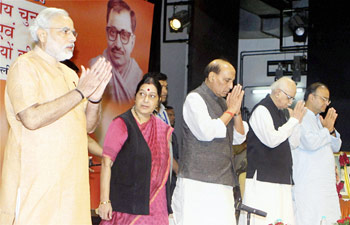 New Delhi, Aug 19: Gujarat Chief Minister and the BJP election camp¬aign committee chief Nar-e¬ndra Modi’s poll mantra to party leaders at the crucial meeting on Sunday was to meet the political aspirations of all sections of society, including Musl¬ims, whom he feels are also looking for “political space”.
New Delhi, Aug 19: Gujarat Chief Minister and the BJP election camp¬aign committee chief Nar-e¬ndra Modi’s poll mantra to party leaders at the crucial meeting on Sunday was to meet the political aspirations of all sections of society, including Musl¬ims, whom he feels are also looking for “political space”.
At the brainstorming session to discuss poll strategies in the run-up to the Assembly and Lok Sabha polls, which was attended by campaign committee and sub-committee members, state unit chiefs and organisational secretaries, Modi said: “In Gujarat, around 20-25 per cent of minorities voted for the BJP (in the Assembly polls) and we need to reach out to them and other sections of society, including dalits, tribals and poor Muslims in the rest of the country also.”
Modi, considered a Hindutva icon, said he told the minority community in his state that the Congress had not done anything for them. He asked party leaders to adopt a similar approach across the country to win over the minority voters. He also said there are different segments within the Muslims, like Shias, Sunnis, Bohras and others, and they can be reached with promises of redressing their specific grievances.
Still blamed by many for the post-Godhra riots, Modi’s recent “puppy” analogy, while referring to the 2002 riot deaths had triggered a political slugfest. The party also gave a call to work for the success of "Mission 272+" for the general polls and winning the Assembly polls in Delhi, Madhya Pradesh, Chhattisgarh and Rajasthan.
Interestingly, party veteran L.K. Advani, considered Modi’s strongest critic, praised the "success" of Modi’s recent Hyderabad rally, it is learnt. Advani attacked the Congress for its "misgovernance" and said the BJP needs to utilise the fact that people are looking for a change because of the Congress’ misrule.
The party top brass asked leaders and workers to strengthen the party till the booth level and reach out to prospective voters from all segments and age groups. Both Modi and party chief Rajnath Singh said that the mood in the country is strongly against the Congress and the main opposition is the only viable alternative.
Modi underscored the need for tapping the young and first-time voters who, he said, are restless for change. Modi said the party needs to implement its poll plans effectively in the coming 200 days.
The party is planning to start the candidate selection process from next month.
Meanwhile, Rajnath Singh issued a virtual gag order on state units not to pass any resolution demanding Modi to be declared the prime ministerial candidate. Reprimanding the Bihar unit office-bearers, including senior leader Sushil Kumar Modi, for passing such a resolution on Saturday, Singh said he is aware of his responsibilities and knew what decisions need to be taken and when, sources said. He also reiterated the party’s stand that only the parliamentary board will decide on the PM candidate.





Comments
Add new comment